How venereal diseases were treated in the old days: lead weights, a whip and mercury ointments
Categories: Europe | Health and Medicine | History | Science | World
By Pictolic https://pictolic.com/article/how-venereal-diseases-were-treated-in-the-old-days-lead-weights-a-whip-and-mercury-ointments.htmlDespite the fact that sexually transmitted diseases have been known for more than one century, they were effectively treated relatively recently, in the second half of the XX century. Before that, the unfortunate people suffering from "bad" diseases were used by the aesculapians with the most strange and barbaric methods. Such treatment not only did not contribute to the cure, but, on the contrary, crippled the patient and shortened his life.
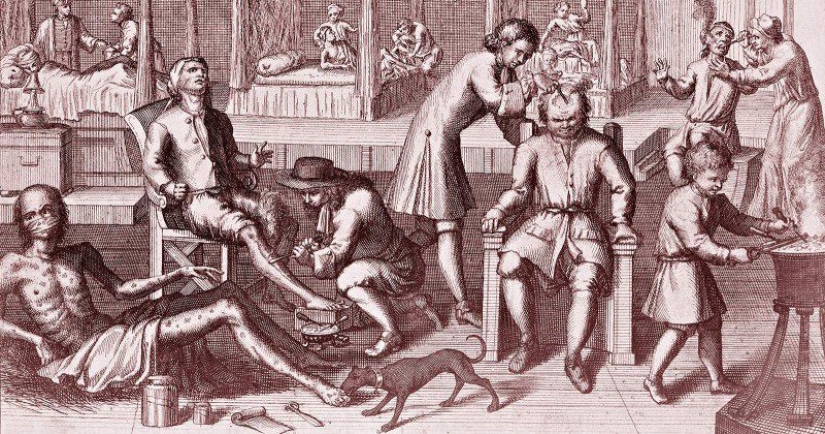
The biggest problem with the treatment of sexually transmitted diseases in the past was the lack of understanding of what the problem is related to. Not everyone knew how the disease was transmitted and few doctors could distinguish the symptoms of STDs from other ailments.
Nevertheless, many ancient civilizations had a sufficient level of medical knowledge to correctly diagnose diseases and understood their nature well. On one of the most famous written monuments of Ancient Egypt, the Ebers papyrus, you can see doctors conducting some manipulations with a patient in the groin area.
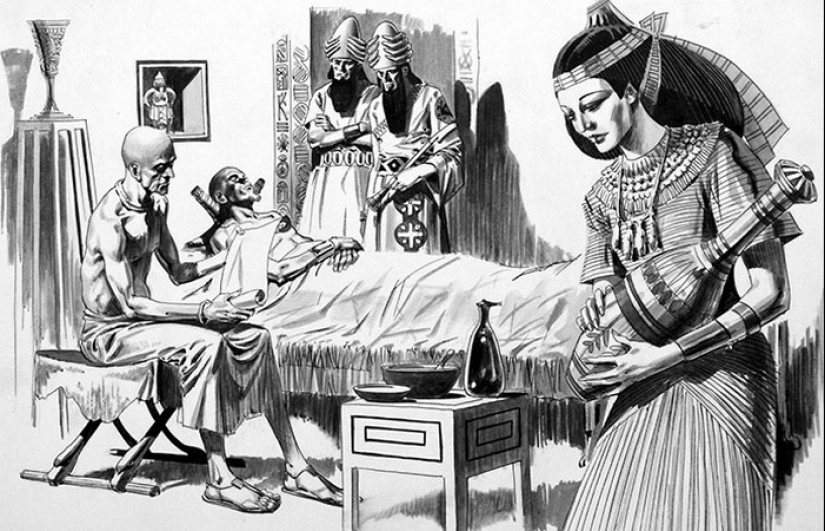
What is happening in this illustration, Professor Franjo Gruber (Franjo Gruber) in his book "The History of venereal diseases from antiquity to the Renaissance" interprets as the treatment of urethral infection with sandalwood oil. This problem in a resident of Egypt could well be associated with a sexual infection.
This method of combating venereal diseases was not the only one among the Egyptians. They actively conducted rituals with spells to expel evil spirits from the infirm, and also used all sorts of mystical medicines: ointments and lappings from herbs and minerals mixed with crushed cow horn and garlic.
Medical historians believe that the ancient Gorki were well aware of the nature of the spread of sexually transmitted infections. Therefore, we have received information about ways to protect against such diseases. Before the sexual act, the inhabitants of Hellas washed thoroughly, after which they rubbed the perineum with various oils.
But if the disease could not be avoided, which in general is not surprising with this method of protection, then the treatment was practiced simple and radical. The famous physician Soran of Ephesus prescribed lead weights to his patients with gonorrhea.
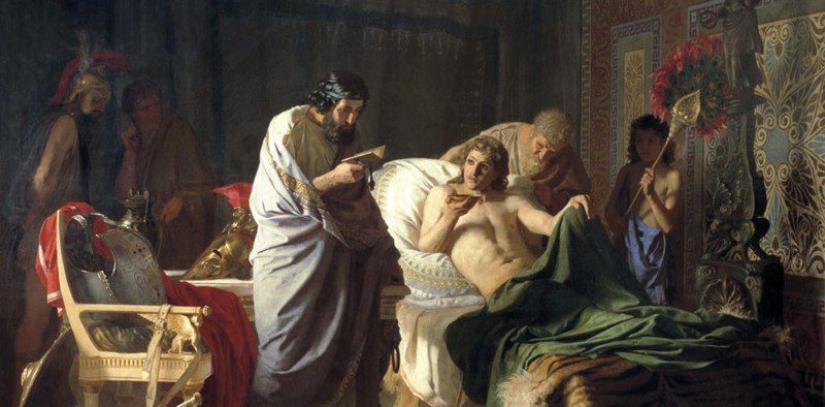
They had to be worn for general strengthening of the body. A well-known Greek doctor was sure that gonorrhea is caused by a general weakness of the body and physical exertion will remove it like a hand. We have not received statistics concerning the cure by this method, and even more information about how Soran explained the lack of effect.
Those who managed to catch herpes were much less lucky. This disease was cured by a very original method — burning with a red-hot iron. After treating the affected areas in this way, the patient was considered cured. Until next time.
In the Middle Ages, mercury was a popular remedy for many ailments. But it was especially often used for the treatment of sexually transmitted diseases. One of the founders of modern medicine, the Swiss physician and alchemist Paracelsus, strongly recommended mercury ointments for external use.
Most often, mercury ointment was rubbed into the legs, which significantly shortened the patient's life and, in general, led to a decrease in the number of STD patients. One more supporter of mercury treatment was the Italian doctor Giovanni de Vigo, who treated almost everything with mercury, considering it almost a panacea.
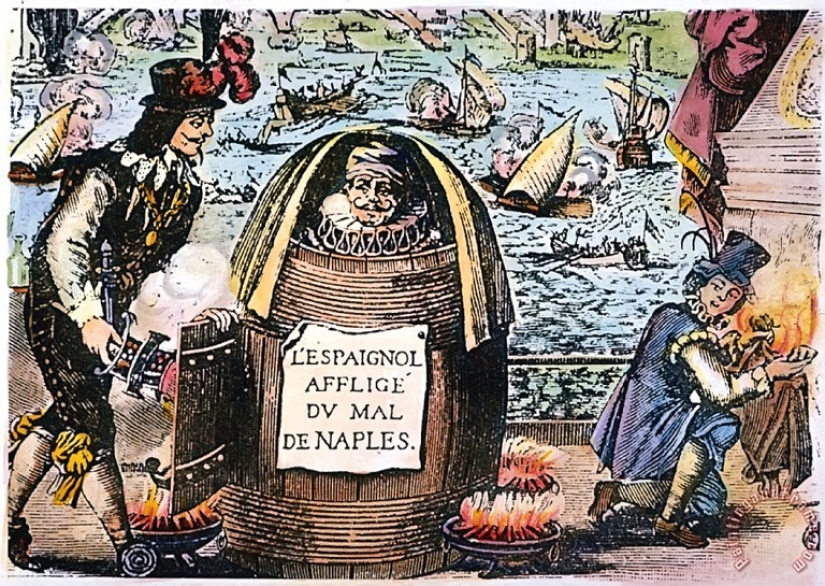
The mercury period in European medicine lasted for almost four centuries and no one can say exactly how many lives were taken by such treatment. In the XVI century, in the era of Great discoveries, rich patients of famous doctors were able to afford one more medicine obtained from distant countries — the resin of the hawaiian tree (Lignum vitae), which was brought from faraway Jamaica. Unfortunately, we do not have information about how effective this tool was.
The most advanced treatment was offered in the XIII century by the Italian doctor Rogerius of Salerno, the full namesake of a famous nobleman. All his life, the scientist worked on creating a manual on surgery and wrote one of the most detailed reference books at that time.
Most of the methods of treatment for Rogerius looked frightening, mainly due to the lack of The Middle Ages of anesthesia and antibiotics. So, the doctor offered syphilis patients treatment with leeches, which should suck all the infected blood out of the body, or copious bloodletting.
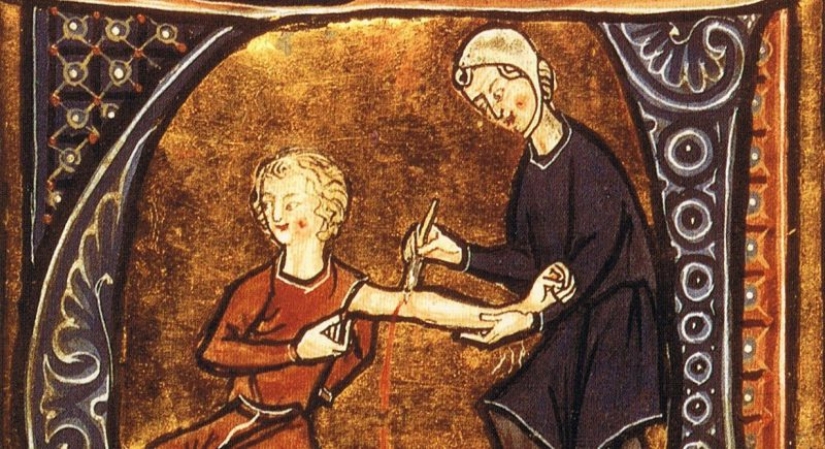
One more innovative method at that time from an Italian doctor was the so-called "urethral irrigation". At the same time, a steel or copper tube was inserted into the urethra, through which various medicinal drugs were poured.
Lead is widely used in the fight against syphilis. Ointments and lapping were made from it, and a little later they even began to take baths with its vapors. The so — called "sweaty clothes" - pieces of fabric soaked in a liquid with a high lead content-were very popular.
At the end of the XVII — beginning of the XVIII century, a simple and harmonious system of treatment of venereal ailments was invented in France. It consisted of three stages. At first, the patient was publicly flogged in the city square. After that, the patient was sent to the hospital, where he was examined and, if the disease was not too advanced, treatment was started.
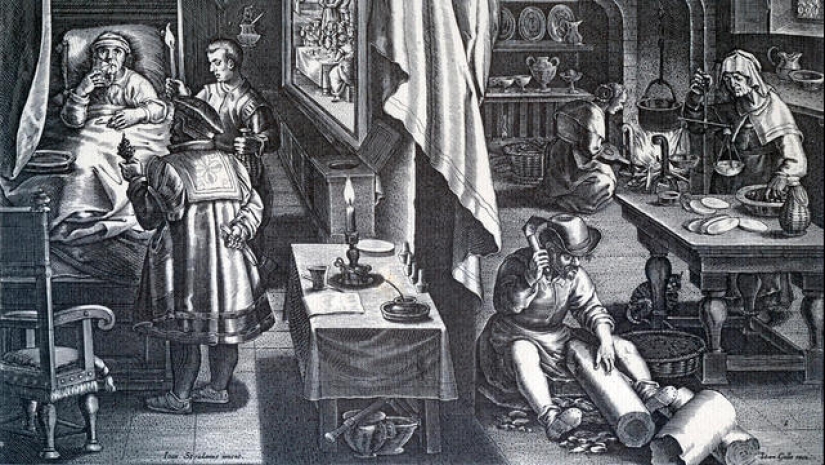
The patient was given bloodletting, gastric lavage, and then prescribed water procedures. The unfortunate one was bathed in cold water for two weeks and then, as a farewell, another gastric lavage was performed. After that, the good old mercury was used — the patient was rubbed with an ointment with this metal.
After all these bullying, it was believed that medical science had done everything possible for healing and the patient was put out of the clinic, regardless of the result of therapy.
For England of the century before last, STDs became a real disaster. The sailors of the" lady of the seas", returning from a campaign, often brought with them exotic ailments, compared to which syphilis and gonorrhea were childish babble.
Sailors and soldiers were also actively infected in the brothels of port cities, where they rushed as soon as they left the ship. Prostitution was an incredibly popular occupation, and only the most educated and well-off residents of the kingdom could afford to protect themselves.
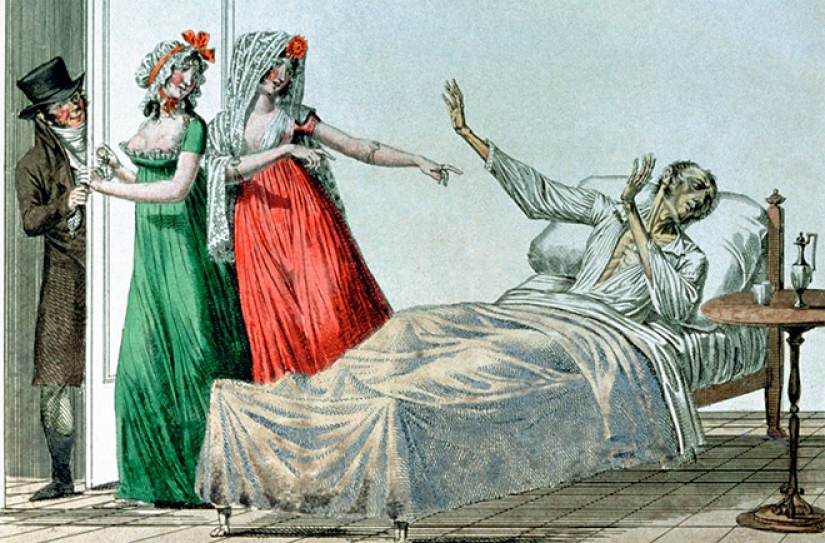
The syphilis epidemic led to the fact that in the 1860s, the priestesses of love began to be considered criminal elements and began to actively fight prostitution, which had previously been overlooked. British police officers had the right to stop a woman suspected of prostitution on the street and demand her to undress.
If any signs of a bad disease were found on the body, the woman was immediately sent for compulsory treatment to one of the closed-type hospitals. Those who resisted the compulsory examination were sent to prison for a period of one year.

At the same time, the conditions in the royal prisons of the late XIX century were not too different from the medieval ones — the inmates were severely starved, suffered from cold and infectious diseases. It is difficult to say how effective this method was in combating the spread of STDs, but it is likely that the chance of surviving behind bars was slightly higher than after treatment with mercury ointments and baths with lead salts.
Today, we can not only successfully treat sexually transmitted diseases, but also have a sufficient level of knowledge to avoid them. You just need to show responsibility and not ignore the simplest means of protection.
Keywords: Medicine | Treatment | Sexual intercourse | Procedures | Syphilis | The middle ages | Prison
Post News ArticleRecent articles

It's high time to admit that this whole hipster idea has gone too far. The concept has become so popular that even restaurants have ...

There is a perception that people only use 10% of their brain potential. But the heroes of our review, apparently, found a way to ...
Related articles

Sex — is not only enjoyable, but also a very useful exercise. Orgasm improves the General condition of the organs and ...

To eat a bowl of chicken soup when you have a fever and runny nose — a great idea, but just as some foods help to get better ...

Because of the coronavirus pandemic, many of us feel tired and irritated. And if fatigue occurs due to stress and lack of sleep, ...

New Year's is a time to surprise and delight loved ones not only with gifts but also with a unique presentation of the holiday ...